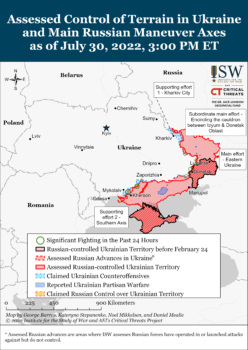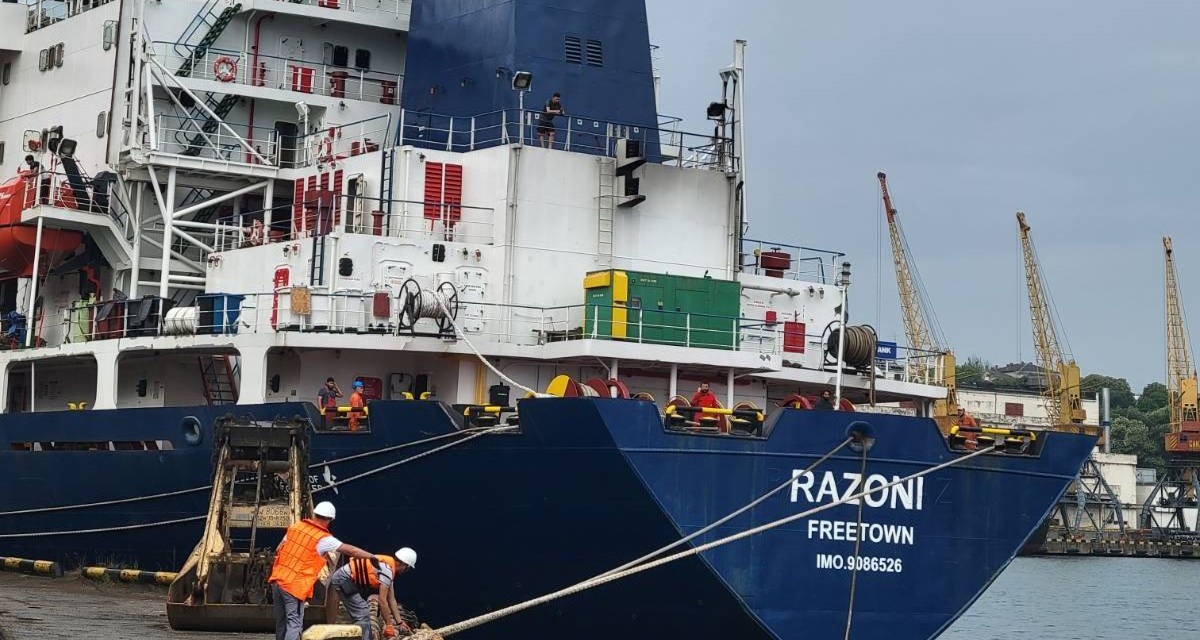The Sierra Leone-flagged Razoni, before its departure from Odesa in southern Ukraine on Monday with Ukrainian grain
EA on Times Radio: Russia Seizes Gold From Sudan To Fund Ukraine Invasion
Monday’s Coverage: Russia’s Troops Refusing to Serve in Occupied South?

Source: Institute for the Study of War
UPDATE 1441 GMT:
Canada has sanctioned another 43 Russian military officials and 17 entities.
Foreign Minister Melanie Joly said, “The Russian war machine’s egregious actions will not be forgotten, and Canada will continue to work with its partners in the international community to hold it to account.”
Canada has sanctioned more than 1,150 Russian individuals and entities since the start of the invasion.
UPDATE 1425 GMT:
Russian soldiers have accused superiors of detaining them in eastern Ukraine, after they refused to take part in the invasion amid serious failures of command.
Lawyer Maxim Grebenyuk, who runs the Moscow-based Military Ombudsman, said at least four Russian troops hve filed written complaints with the Prosecutor General’s office, seeking punishment of superiors.
We already have a list of 70 Russian soldiers who were held as prisoners. In total, about 140 soldiers were held.
One soldier filed testimony that he was detained for more than a week from July 19 in different cells in the Russian proxy “Luhansk People’s Republic”.
As a result of what I believe were tactical and strategic mistakes made by my commanders … and their total disregard for human life…I made the decision not to continue in the military operation.
He was initially held without food in a cell with 25 other members of his unit. Then he was transferred to the town of Bryansk in Luhansk, detained in a former school with about 80 other soldiers from different units who were also refusing to participate because of poor command.
The soldier said the detainees were guarded by by members of the Russian mercenary firm Wagner Group:
They told us that mines had been placed outside the military base and that whoever tried to flee would be considered an enemy and shot on the spot.
We were fed once a day at lunchtime. There was no basic hygiene.
The whole time, not a single document was provided that would explain our arrest.
UPDATE 0815 GMT:
A 25-year-old teacher in a village near Kherson city speaks to AFP about life under Russian occupation.
The roads of the region are dotted with numerous checkpoints, and you can always hear bombing raids. There are many soldiers in the cities.
In Kherson itself, it is very depressing. There is no more medicine at all and many elderly people have died because of lack of treatment. For the elderly, it’s hell.
If I had to describe the situation in one word, I would say “difficult”. There is a total collapse of public services. The ruble is not circulating. Passports are not being issued – nobody wants them anyway.
We have enough food, although there is very little delivery of humanitarian aid. Many people are left without work, and often only unskilled laborers are left.
In the first weeks of the occupation, a lot of activists were kidnapped. There were big demonstrations against the occupation, but after a month it stopped, because there is no internet, no communication.
And all the activists are either hiding or have been kidnapped or killed, I don’t know.
If the Russians hear you speaking Ukrainian, they think you are a Nazi. They check social networks, tattoos, if you have Ukrainian symbols on your body, you are in trouble. I know that some people have had their tattoos removed.
UPDATE 0805 GMT:
The Biden Administration has authorized another $550 million in military aid for Ukraine, including ammunition for the HIMARS medium-range rocket systems which are changing the military balance over the Russian invasion.
The aid also includes 75,000 rounds of 155mm artillery ammunition.
On Monday, Ukraine Defense Minister announced the arrival of four more US-supplied HIMARS medium-range rocket systems, bringing the total to 16.
The first 12 wheel-mounted systems have been used effectively by Ukrainian forces in dozens of attacks on Russian logistical positions, ammunition depots, and bridges.
Total US military assistance to Ukraine during the Russian invasion is now more than $8.8 billion.
UPDATE 0759 GMT:
Russian shelling has killed three people evacuating in a minibus near Kherson city in southern Ukraine.
The minibus was carrying seven evacuees from the Russian-occupied village of Starosillia. The survivors have been hospitalized.
UPDATE 0656 GMT:
A Yale University study has documented the cost to the Russian economy of Vladimir Putin’s invasion of Ukraine and consequent international sanctions.
The report details “a war of economic attrition”, using data from consumers and from Russia’s international trade and shipping partners.
Commodity exports have declines, with Russia trying to replace European markets with those in Asia.
Imports have largely collapsed, causing serious problems with components and technology. As a result, some sectors have almost shut down, with automobile manufacture declining by 89% and fiber optics down 80%.
Russian domestic production has come to a complete standstill with no capacity to replace lost businesses, products, and talent.
The hollowing out of Russia’s domestic innovation and production base has led to soaring prices and consumer angst.
About 1,000 international companies, representing about 40% of Russian GDP, have left the country.
The Kremlin has tried to assuage the crisis with fiscal and monetary intervention, but the Yale authors say the measures are unsustainable. The Government budget is indeficit for the first time and “in much, much more dire straits than conventionally understood”. Russian financial markets — with an eye on future outlook — are the worst-performing in the world.
The report notes:
Since the invasion, the Kremlin’s economic releases have become increasingly cherry-picked, selectively tossing out unfavorable metrics while releasing only those that are more favorable.
These Putin-selected statistics are then carelessly trumpeted across media and used by reams of well-meaning but careless experts in building out forecasts which are excessively, unrealistically favorable to the Kremlin.
The analysts conclude that if sanctions are maintained, Vladimir Putin has no path out of “economic oblivion”: “Defeatist headlines arguing that Russia’s economy has bounced back are simply not factual — the facts are that, by any metric and on any level, the Russian economy is reeling.”
UPDATE 0621 GMT:
Output from Russian State gas producer Gazprom is at its lowest level since 2008, as Vladimir Putin tries to use the energy weapon to break European support for Ukraine.
Gazprom supplied 774m cubic meters per day in July, 14% less than in June. Total output for 2022 up to July 31 was 262.4bn cubic meters, a 12% decrease compared with the same period last year.
ORIGINAL ENTRY: The first ship loaded with Ukrainian grain left Odesa in southern Ukraine on Monday, following a deal on July 22 to lift the Russian blockade of Black Sea ports.
The Sierra Leone-flagged ship Razoni, carrying 26,000 tons of corn, sailed for Lebanon.
A moment: The Razoni making her way out of the port of Odesa with 26,000 tonnes of Ukrainian grain.
A small but significant start . pic.twitter.com/7CpoaoqtdM
— James Waterhouse (@JamWaterhouse) August 1, 2022
Ukraine’s Infrastructure Minister Oleksandr Kubrakov said in a statement, “Ukraine together with our partners has taken another step today in preventing world hunger.”
In his nightly address to the nation, President Volodymyr Zelenskiy hailed “the first positive signal that there is a chance to stop the development of a world food crisis”.
However, he cautioned that it is “too early to draw any conclusions”: ““We cannot have the illusions that Russia will simply refrain from trying to disrupt Ukrainian exports.”
For the moment, the Kremlin — having threatened to disrupt the deal within hours of its signature — said the Razoni’s sailing was “very positive”.
Soaring Global Food Prices
The agreement was brokered by Turkey and the UN, and signed in parallel documents with Ukraine and with Russia. However, within 12 hours, the Russians jeopardized the deal by firing missiles on Odesa, following up with a second attack days later.
More than 20 million tons of Ukrainian grain have been blocked amid Russia’s cutoff of ports and bombing of storage warehouses. Kyiv’s officials expect to bring in more than $10 billion in export revenue if the Russian blockade is not renewed.
The Russian invasion and blockade have fed a spike in global food prices. The World Bank warned in a report on Monday that many countries face an increase in food bills of more than 1% of annual GDP, with some in a debt crisis.
Lebanon, still reeling from an explosion that damaged much of the port of Beirut in August 2020, has a food inflation rate of 332%. It is followed by Zimbabwe’s 255%, Venezuela’s 155%, and Turkey’s 94%.

